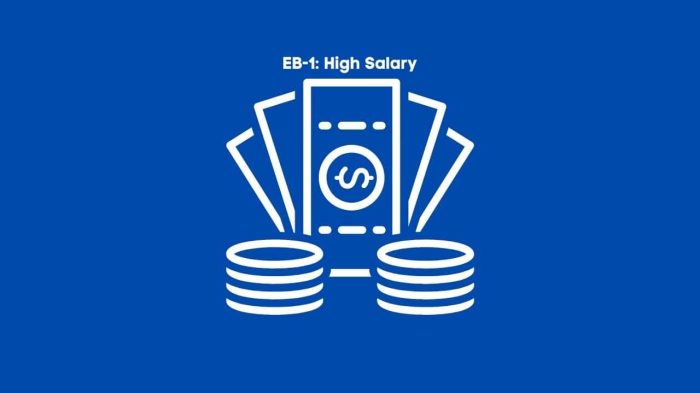Introduction
If you think you have extraordinary skills, you must have thought of earning more than others in your field. Skills are directly related to your income, and USCIS considers this and will label your ability as “extraordinary” if your income is comparatively higher than others in your field. Sethi and Mazaheri Law firm brings you another article on the EB-1 series where we explain the ten criteria laid down by the USCIS for establishing your extraordinary ability.
In this article, we will discuss the criterion “Evidence that you command a high salary or other significantly high remuneration about others in the field” and look upon what is considered as salary and what is not.
In our immense immigration experience, we have found the “high salary or other significantly high remuneration” criterion as one of the simplest to claim when the specific proof needed is both accessible and qualifying. So, if you think that you have sufficient evidence to fulfill the requirements of this criterion, do not think twice before submitting proof.
As an alien seeking to claim the “High Salary or other significantly high remuneration” criterion, there are a few things to think about before collecting sufficient proof to meet this criterion. To claim this criterion, one must present evidence of salary/remuneration receipts in the form of official government tax returns. (i.e., Form W-2s, Form 1099s, or the foreign equivalent)
What qualifies as salary for the “High Salary or other significantly high remuneration” criterion?
The regulation’s plain language uses the words “salary” and “other significantly high remuneration.” As an employee, you get paid in different arrangements, and if you are applying for an EB-1 visa, it becomes essential for you to understand what methods can be included as a part of your salary and what cannot. The Merriam-Webster dictionary defines salary as “fixed compensation paid regularly for services” and remunerate as “to pay an equivalent for a service.” You should note that these words are used interchangeably in most cases.
The point here to note is that payments in the form of benefits obtained by an employee such as tuition reimbursements, healthcare/medical allotments, profit-sharing incentives, stock options, 401(k) contributions, etc., do not qualify as your salary or remuneration for this criterion. This is because these benefits are rarely reflected in individual tax returns and are provided as employment benefits.
Do bonuses qualify as a part of salary or remuneration? If we talk about bonuses, the ideal answer is that they can be treated as a part of salary provided that the alien has actual receipt of bonuses, and they are reflected in the total wages section of the individual’s tax returns.
How should I compare my salary or remuneration to others in the same field?
The burden to prove that your earnings are relatively higher than others in your field remains on you, and the evidence can take many forms. Firstly, the comparison should be made on equal parameters. That is, you cannot compare your gross salary to another’s base salary and submit the comparison as a piece of evidence to the USCIS. Your claims would eventually be rejected, or USCIS will ask for additional proof from you. If you consider others’ base salary in the field, you should show a higher base salary or remuneration to satisfy the assessing USCIS officer.
You can use the following factors to compare your earnings to others: geographical location, position at the organization, average competitor’s pay, etc.
You can use the data from websites like https://www.bls.gov, https://www.careeronestop.org/Toolkit/Wages/find-salary.aspx?frd=true or https://www.flcdatacenter.com to collect evidence for this criterion.
Regardless of using such data for comparative analysis of your salary being high for others in the field, it is essential to check that the salary is above the 90th percentile of comparable wage data. That is, in simple language, your earning should be more than 90% of the people in your field, or you should be among the top 10% earners in your field.
It will remain challenging for the assessing officer to deem you as an eligible person for this criterion if you do not provide sufficient evidence.
What about my geographical disadvantage on my salary?
In general, if you can prove that your salary or remuneration is higher than the American top earners in your field, you are in an excellent position to satisfy this category. But some may argue that they have location disadvantages and the average income at their location is much lower than the average American pay for the same work. USCIS considers this argument and approves the application if you can prove that your earnings are relatively higher than the others in your home country. This will show that you possess extraordinary ability in your field, and the employers at your location recognize your talent.
Conclusion
Having a high salary is an advantage in this world, and getting your US visa because of that salary is a blessing. Suppose you are among them and want to travel to the US on an EB-1 visa under the “alien of extraordinary ability” category. In that case, you should consider the “high salary or other significantly higher remuneration” criterion as part of the evidence for your application.
Immigration attorneys at Sethi and Mazaheri law firm aim to help individuals in getting their US visas approved. If you face trouble with your visa application, you can contact us through our “contact us” page, and our experienced immigration attorneys will get back to you to hear your concerns.









 by Prozco®
by Prozco®